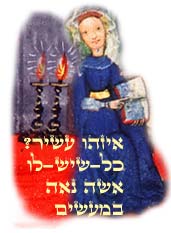|


Rabbinic marital ideals mirror to a great degree those of Jews of the Second
Temple period. A wife (and only a wife) was expected to be sexually faithful
to her husband, in return for which her husband would honor her. After reviewing
the evidence for these basic marital expectations, I will turn to two special
areas of rabbinic marital ideals, love and the existence of a sentimental ideal.
Wives were expected to remain modest. This issue was so fundamental that it
was incorporated into mishnaic law:
|

"Who
is rich?" Rabbi Akiva said:
"He who has a wife whose ways are pleasant".[8]
|
These women should be divorced
and do not recover their marriage settlements: One who transgresses the law
of Moses and Jewish
[law].
What is the "law of Moses"? If she feeds him untithed food; or has
intercourse with him while she is menstruating; or she does not separate a dough
offering [from the bread]; or she makes a vow and does not fulfill it.
What is "Jewish law"? If she goes out with her head uncovered; or
she spins in the market; or she speaks with any man.
Abba Shaul says: "Even if she curses his [i.e., her husband's] children
in front of him."
Rabbi Tarfon says: "Even a kolanit."[1]
The mishnah begins with
a discussion of a wife's religious obligations within a marriage. It enumerates
two types of severe transgressions, those in which she causes her husband to
violate a law over which she has control ("law of Moses"), and those
of immodesty. Should a wife conduct herself immodestly (i.e., contrary to "Jewish
law"), her husband can divorce her and keep her marriage settlement. The
talmudic commentary strengthens this mishnaic rule; the prohibition on a woman
appearing in public with uncovered hair is decreed to be [from the Torah].[2]
Even the odd mishnaic term kolanit ("a loud woman") is interpreted
in both talmuds as being related to sexual modesty, referring to a woman who
is loud during sex.
Rabbinic sources repeatedly
emphasize the importance of wives covering themselves and comporting themselves
properly. This most often translates, as we have just seen, into a woman covering
herself (especially her hair) when she goes out and not talking with other men.
The ideals of modesty are summarized in a well-known tradition:
Rabbi Meir used to say:
Just as there are opinions about eating, so too are there opinions about women.
You have a man who, when a fly passes over his cup, puts [the cup] down and
won't taste it. This is one who has a bad portion in women, and who intends
to divorce his wife.
You have a man who, when a fly lands in his cup, picks it out and then won't
drink [the cup]. This, for example, is Pappus ben Yehudah, who locked his wife
inside when he went out.
You have a man who, when a fly falls in his cup, picks it out and then drinks
[the cup]. This is the average man, who when he sees his wife talking with her
neighbors or relatives leaves it be.
You have a man who, when a fly falls into his plate, takes [the fly], sucks
on it, and then throws it away and eats what is on it. This is an evil man,
who saw his wife go out with her hair uncovered; or go out with her sides revealed;
or acting crudely with her male or female slaves; or spins in the market; or
bathes and sports with any man; it is a mitzvah to divorce her.[3]
A later tradition condemns
Pappus Ben Yehudah for behaving excessively, but this tosefta clearly
disapproves of wives going about uncovered or talking to strange men. Rabbinic
sources see especially the uncovering of the hair as a sign of a wife's dissoluteness.[4]
The rabbinic concern over
a wife's modesty reaches an almost hysterical pitch in discussions of the sotah,
the suspected adulteress. According to Numbers 5, a man who suspects his wife
of adultery, but who has no concrete proof that she actually committed adultery,
can cause her to submit to a trial by ordeal. Although they acknowledge that
the ordeal is no longer operative, the rabbis dwell on its effects in almost
pornographic detail, well beyond the biblical description.[5]
At the same time, they attempt to define precisely how long a woman can remain
alone with a man before she is suspected of adultery. While she may no longer
be subjected to the ordeal, the woman declared a sotah can be immediately divorced.[6]
Women who even give the impression of impropriety can be legally disadvantaged.
A rabbinic exemplum nicely
illustrates the value placed on a wife's modesty:
Kimhit had seven sons, and
all of them served as High Priest. The sages sent and said to her, "What
good deeds do you have [i.e., have you done]?" She said to them, "May
[ruin] come upon me if the rafters of my house have ever seen the hair of my
head or the hem of my undergarment." They said, "All flour (kemah)
is flour, but the flour of Kimhit is fine flour." And they applied to her
the verse, "In the palace honour awaits her; she is a king's daughter,
arrayed in cloth-of-gold richly embroidered".[7]
Modesty is not only a virtue
for outside the home. A wife should be modest even within her home. Kimhit's
reward, the birth of seven sons of high status, also reflects the domestic sphere
in which the rabbis expected women to work.
The same expectations did
not apply to Jewish husbands. Some rabbinic sources argue that a man who engages
in extramarital affairs cannot expect anything different from his wife, but
these apply mainly to liaisons with a married woman. Underlying the rabbinic
condemnations of husbands engaged in extramarital affairs is not the ideal that
a man should remain sexually faithful to his wife, but the more general rabbinic
value placed on male self-control in all things. That is, the rabbis never suggest
that a man should remain sexually faithful to his wife because she has some
right to expect this, or that male and female expectations are reciprocal. The
rabbis do value male modesty, but it is not part of their understanding of a
marital ideal.
In return, a husband was
advised to honor his wife. The rabbis incorporated into legislation the idea
that a woman must honor her husband. Both [Babylonian and Jerusalem] talmuds
interpreted the mishnaic list of tasks that a woman must do for her husband
in this light. The Babylonian Talmud went further than the Palestinian one,
interpreting some wifely tasks (e.g., mixing his cup and making his bed) as
demonstrations of her devotion to her husband.
 |
[1]
Mishnah Ketubbot 7:6 [back]
[2]
Ben Sira 26:13, 15; 36:2
[back]
[3] Tosefta Sotah 5:9
[back]
[4] Mishnah Sotah 1:5-6, Tosefta Sotah 3:2-4, JT Sotah
1:7, 17a [back]
[5] Mishnah Sotah 1:5-6,, Tosefta Sotah 3:2-4 [back]
[6] Mishnah Sotah 6:1
[back]
[7] Ps. 45:13-14; JT Yoma 1:1
[back]
[8]
(BT Shabbat 25b) [back]
|
 |
 From:
Michael L. Satlow, Jewish Marriage in Antiquity, pp. 228-230. Copyright
© 2001 Princeton University Press. From:
Michael L. Satlow, Jewish Marriage in Antiquity, pp. 228-230. Copyright
© 2001 Princeton University Press.
|
|



